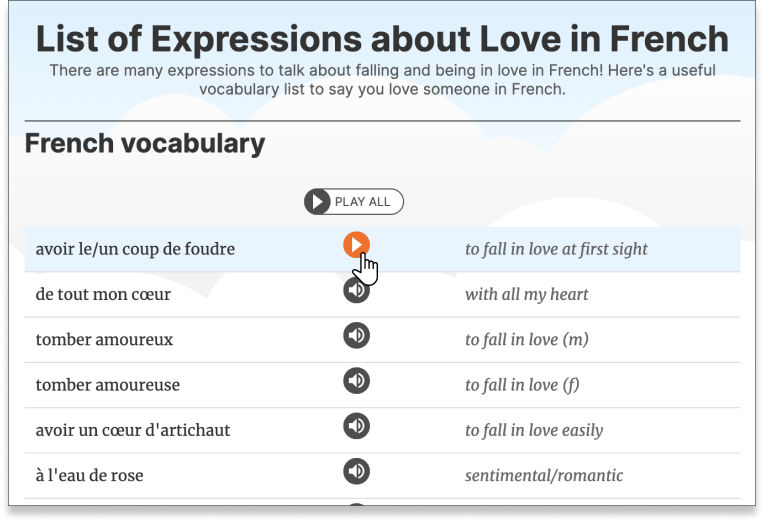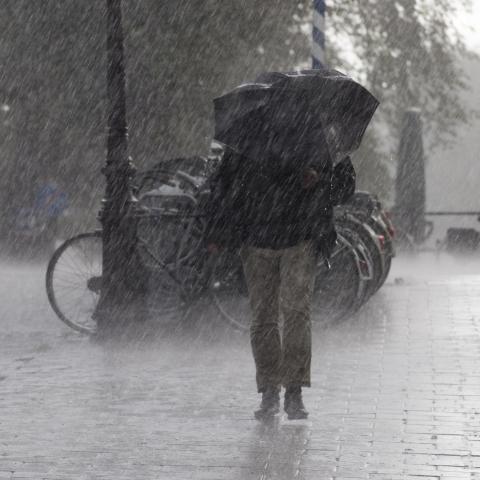Write an essay in French
Beyond the fact that writing an essay in French can be a good practice to improve your writing, you may also be asked to write one during your schooling. So, it is important to study the topic of French essay writing and get some useful tips..
» Tips and tricks for your French essay » The structure of a French essay » Sample French Essay

Tips and tricks for your French essay
When writing a French essay for school, you should always use a structured approach and good French skills to present your arguments in a focused way. Beyond French skills, there are also important formal requirements for a successful French essay. We will come back to this in detail later. First, you will find some useful tips and tricks that will help you write more compelling and better French essays in the future.
- Have a clear thesis and structure
- Do sufficient research and use reliable sources
- Use examples and arguments to support your thesis
- Avoid plagiarism and cite correctly
- Always check structure, grammar and spelling
When you write your essay at school or university, you need to make sure that the general structure of your essay, the presentation of the arguments and, above all, your French language skills play a role in the mark you will get. This is why you should definitely take a closer look at the structure of an essay as well as the most important grammar rules and formulations for French essays.
The structure of a French essay
In an essay, you deal at length and in detail with a usually given topic. When you write an essay in French, you must follow a certain structure. Below we show you what this structure looks like and give you some tips for writing the most important parts of your essay.

The Introduction
The introduction prepares the main body of your essay. You think of a meaningful title for your essay, you describe your thesis or your question, you give general information on the subject and you prepare your argument by giving an overview of your most important arguments.
Below are examples and phrases that you can use to write the introduction to your essay in French.
The title should be meaningful, concise and reflect the content of the essay.
Introductory paragraph
The first paragraph of your French essay should briefly introduce the topic and engage the reader. Here are some examples to help you write your essay:
Proposal or question
The central proposition or question of your French essay should be a clear and concise definition of the purpose of the essay. Use these examples to get a clearer idea of how to write theses in French:
Overview of Arguments and Structure
At the end of your introduction, describe the structure of the main part of your essay (your outline) and outline your argument. Here are some French expressions that will certainly help you write your essay:
The body of your essay

The main part of your French essay deals with the given topic in detail. The subject is studied from all angles. The main body of your essay follows a thread of argument and discusses in detail the main arguments of your thesis previously made in the introduction.
In the body of the text, you should discuss the subject of your essay in clear and concise language. To achieve this, we give you some wording aids as well as vocabulary and phrases that you can use to write your essay in French.
Formulation tools:
French vocabulary for essays.
In the conclusion of your French essay, you address the thesis of your essay, summarize the main points of your discussion in the main body, and draw a conclusion. On the basis of the arguments and the resulting conclusions, you formulate in the conclusion of your dissertation final thoughts and suggestions for the future. It is important that you do not add new information or new arguments. This should only be done in the body of your text.
Here are some wording guides to help you write your essay in French:
Sample French Essay
Les avantages des voyages linguistiques
Malgré les difficultés potentielles, les voyages linguistiques offrent aux apprenants une occasion unique d'améliorer leurs compétences linguistiques et de découvrir de nouvelles cultures, ce qui en fait un investissement précieux pour leur développement personnel et académique.
Les séjours linguistiques sont des voyages organisés dans le but d'améliorer les compétences linguistiques des participants. Ces voyages peuvent se dérouler dans le pays ou à l'étranger et durer d'un week-end à plusieurs semaines. L'un des principaux avantages des séjours linguistiques est l'immersion. Entourés de locuteurs natifs, les apprenants sont contraints de pratiquer et d'améliorer leurs compétences linguistiques dans des situations réelles.Il s'agit d'une méthode d'apprentissage beaucoup plus efficace que le simple fait d'étudier une langue dans une salle de classe.
Un autre avantage des séjours linguistiques est l'expérience culturelle. Voyager dans un nouveau pays permet aux apprenants de découvrir de nouvelles coutumes, traditions et modes de vie, et de se familiariser avec l'histoire et la culture du pays. Cela enrichit non seulement l'expérience d'apprentissage de la langue, mais contribue également à élargir les horizons et à accroître la sensibilisation culturelle.
Cependant, les séjours linguistiques peuvent également présenter des inconvénients. Par exemple, le coût du voyage et de l'hébergement peut être élevé, en particulier pour les séjours de longue durée. En outre, les apprenants peuvent être confrontés à la barrière de la langue ou à un choc culturel, ce qui peut être difficile à surmonter. Le coût et les difficultés potentielles des séjours linguistiques peuvent sembler décourageants, mais ils offrent des avantages précieux en termes d'épanouissement personnel et scolaire.
Les compétences linguistiques et les connaissances culturelles acquises peuvent déboucher sur de nouvelles opportunités d'emploi et améliorer la communication dans un cadre professionnel. Les bourses et les aides financières rendent les séjours linguistiques plus accessibles. Le fait d'être confronté à une barrière linguistique ou à un choc culturel peut également être l'occasion d'un développement personnel. Ces avantages l'emportent largement sur les inconvénients et font des séjours linguistiques un investissement qui en vaut la peine.
En conclusion, malgré les difficultés potentielles, les séjours linguistiques offrent aux apprenants une occasion unique d'améliorer leurs compétences linguistiques et de découvrir de nouvelles cultures, ce qui en fait un investissement précieux pour le développement personnel et académique. Qu'il s'agisse d'un débutant ou d'un apprenant avancé, un voyage linguistique est une expérience à ne pas manquer.
Improve your writing style in French
Learn French with us. We will help you improve your writing skills.

Improve your French with Sprachcaffe

A Year abroad for high school students
Spend a unique school year abroad

Online French courses
Learn French from the comfort of your own home with an online course

Learn French on a language trip
Learn French in a French-speaking country
French Vocabulary
One of the cornerstones of being fluent in French is to know a lot of French vocabulary.
In this section, you’ll find not only reliable lists of French vocabulary (many with audio recordings) but also explanations, relevant cultural advice, French pronunciation tips, etc… In other words, not just bullet lists of French vocabulary, but truly useful French vocabulary lists !
- Click to jump to:
- Abbreviations
- Animal - Forest 🦌
- Animals - Farm 🐄
- Animals - zoo 🐆
- Archaeology
- Architecture 🏰
- Bastille Day
- Big ≠ Tall ≠ Fat
- Biking 🚴🏽♂️
- Canadian French
- Charcuterie
- Christmas 🎄
- Comic Books
- Computers 💻
- Condoleances
- Conversation Starters 💬
- Croissants 🥐
- Electricity
- Facial Hair 🧔🏻
- Food Comment
- France & French
- French Open
- Fun & Laughter
- How are you?
- Instruments 🎸
- Invitations
- Love Nicknames
- Maple Syrup
- Medical Exam 🤒
- Menstruations
- Mother's Day
- Onomatopoeia
- Paragliding
- Pet Names 🐶🐱
- Photography
- Pop Culture Phrases
- Religion - Christians
- Religion - Islam
- Renovations & Trades 🛠
- Resolutions
- Riding - Horses 🏇
- Skin Colors
- Slang Evolution
- Table Terms 🍽
- Tools & Repairs 🛠
- Vegetables 🥦
- Vive La France
- Water Sports
- Wine Phrases 🍷
- With Pleasure
- Writing Letters 📨
More free lessons
- How to say I love you in French 20 ways to say I love you in French and 14 softer alternatives
- Talking about the weather Always a useful conversation icebreaker
- French food guide French food is brie-ond belief!
- French Numbers Made Easy The correct French number pronunciation from zero to one billion
- 30 ways to say yes in French In French it’s just a oui-bit different
- French clothes 150 French clothes names, English translation, audio recordings
- Ultimate French Time Guide How to ask and give the time in French
- Describing the body 100+ French body part names and fun videos featuring the Sims
- French jokes Bring a bit of laughter in your French studies
- French Conversation Starters For when you are feeling a bit shy in French
- A to Z French Vocabulary 150 really useful French vocabulary lists with English translations
Recorded at 3 different speeds + Study Guide + Q&A + Full Transcript
Copyright - French Today 2024
- Privacy Policy
- Mentions Légales
- Affiliate Program
Can You Understand Today’s Spoken French?
It’s not just slang. The French everybody speaks in France today is NOT the overly enunciated, extremely formal French usually taught to foreigners.
TAKE YOUR FREE AUDIO TEST NOW

Essential French Academic Vocabulary for Writing and Speaking
Do you want to take your French language skills to the next level? If so, then mastering academic vocabulary is essential. Whether you’re a student, researcher, or academic professional, having a strong academic vocabulary will give you a significant edge.
In this blog post, we’ll explore the fascinating world of French academic expressions and words. We’ll also provide you with some tips on how to master this essential skill. So what are you waiting for? Let’s get started!
The Significance of Academic Vocabulary:
Academic vocabulary plays a vital role in academic pursuits, facilitating comprehension, precision, and effective communication. Here are some reasons why it is essential:
Precision and Clarity: Academic vocabulary offers precise terms that allow for clear expression of complex ideas and concepts.
Comprehension and Critical Reading: Familiarity with academic words enhances understanding and facilitates in-depth analysis of scholarly texts.
Effective Writing: Using appropriate academic vocabulary demonstrates subject knowledge, adds credibility to your writing, and enables concise and persuasive articulation of ideas.
Presentations and Discussions: Employing academic vocabulary enriches participation in academic conversations, seminars, and conferences, fostering meaningful engagement and intellectual discourse.
Essential French Academic Vocabulary:
Below is a list of commonly used academic expressions and words, along with their English translations:
Analyser (Analyze) : Examine in detail to uncover patterns or insights.
French: “Analyser les données recueillies dans l’étude.”
English: “Analyze the data collected in the study.”
Critiquer (Critique) : Evaluate or assess by offering a detailed analysis or opinion.
French: “Critiquer les arguments présentés dans cet article.”
English: “Critique the arguments presented in this article.”
Évaluer (Evaluate) : Assess or judge the value, significance, or quality of something.
French: “Évaluer les performances des étudiants dans l’expérience.”
English: “Evaluate the students’ performance in the experiment.”
Hypothétiser (Hypothesize) : Formulate a tentative explanation or assumption based on limited evidence.
French: “Hypothétiser une relation entre ces deux variables.”
English: “Hypothesize a relationship between these two variables.”
Synthétiser (Synthesize) : Combine separate elements or information to form a coherent whole.
French: “Synthétiser les résultats de différentes études pour parvenir à une conclusion générale.”
English: “Synthesize the findings from different studies to arrive at a general conclusion.”
Méthodologie (Methodology) : The systematic approach used in a research study or investigation.
French: “Décrire en détail la méthodologie utilisée dans cette recherche.”
English: “Describe in detail the methodology used in this research.”
Empirique (Empirical) : Based on observation, experience, or experimental evidence.
French: “Appuyer les conclusions avec des preuves empiriques solides.”
English: “Support the conclusions with strong empirical evidence.”
Revue de la littérature (Literature Review) : A critical analysis and summary of existing research and literature on a specific topic.
French: “Réaliser une revue de la littérature pour identifier les lacunes dans les recherches précédentes.”
English: “Conduct a literature review to identify gaps in previous research.”
Paradigme (Paradigm) : A framework or model that serves as the basis for a particular theory or approach.
French: “Comprendre les différents paradigmes utilisés en psychologie.”
English: “Understand the different paradigms used in psychology.”
Concluant (Conclusive) : Providing a definitive result or settlement.
French: “Présenter des preuves concluantes pour étayer l’hypothèse.”
English: “Present conclusive evidence to support the hypothesis.”
Concept (Concept) : An abstract idea or fundamental principle.
French: “Comprendre le concept de développement durable.”
English: “Understand the concept of sustainable development.”
Déduire (Deduce) : Draw a logical conclusion from given information.
French: “Déduire les implications de cette théorie.”
English: “Deduce the implications of this theory.”
Étude de cas (Case study) : A detailed analysis of a specific subject, often used to illustrate theoretical concepts.
French: “Analyser une étude de cas en psychologie cognitive.”
English: “Analyze a case study in cognitive psychology.”
Expérience (Experiment) : A scientific activity conducted to test a hypothesis or verify a theory.
French: “Concevoir et mener une expérience sur la gravité.”
English: “Design and conduct an experiment on gravity.”
Thèse (Thesis) : An original research work presented to obtain an academic degree.
French: “Rédiger une thèse sur la littérature française du 19e siècle.”
English: “Write a thesis on 19th-century French literature.”
Source primaire (Primary source) : A document or testimony directly related to the event or subject being studied.
French: “Analyser des sources primaires pour comprendre la Révolution française.”
English: “Analyze primary sources to understand the French Revolution.”
Analyse de données (Data analysis) : The systematic examination of data to draw conclusions or identify patterns.
French: “Effectuer une analyse de données statistiques pour tester l’hypothèse.”
English: “Perform statistical data analysis to test the hypothesis.”
Variable indépendante (Independent variable) : A variable manipulated or controlled by the researcher to study its effect on another variable.
French: “Identifier la variable indépendante dans cette étude expérimentale.”
English: “Identify the independent variable in this experimental study.”
Référence bibliographique (Bibliographic reference) : A complete citation of a source used in an academic work.
French: “Citer les références bibliographiques selon les normes de l’APA.”
English: “Cite bibliographic references following APA guidelines.”
Méthode qualitative (Qualitative method) : A research approach focused on in-depth understanding of social phenomena through observations and interviews.
French: “Appliquer une méthode qualitative pour explorer les motivations des participants.”
English: “Apply a qualitative method to explore participants’ motivations.”
Remember, this list of essential French academic vocabulary is a selection, and there are many more terms specific to different fields of study. Regular exposure to academic texts and engagement in academic discussions will contribute to the expansion and refinement of your academic vocabulary.
How to Master Academic Vocabulary in French
Once exposed to these words and expressions and a lot more thanks to your research, you need to practise using academic vocabulary in your own writing and speaking. This will help you to solidify your knowledge and make sure that you can use the vocabulary correctly.
Mastering academic vocabulary in French opens doors to effective communication and comprehension within academic domains. By incorporating these essential expressions and words into your repertoire, you can engage in intellectual discussions confidently.
To accelerate your learning journey, Albert-Learning offers a valuable online teaching platform. You can book a free session with their experienced teachers. By learning these French expressions in context, you can thrive in academic environments. Start your journey today and unlock the power of academic vocabulary in French.
Tags: Francais French language French vocabulary Learn French Albert learning Learn French online
- Next Mots couramment utilisés avec J
- Previous La maîtrise de la grammaire anglaise : Erreurs courantes et comment les éviter
- Pingbacks 1
[…] ces termes anglais ? Continuez à lire notre blog. Vous pouvez également apprendre de nombreuses langues avec nous chez Albert Learning, alors pourquoi attendre ? Commencez à apprendre dès maintenant en […]
Leave a Reply Cancel reply
You must be logged in to post a comment.

Learn french verbs and their forms
- 27 October 2019

Vocabulary related to birds in French
- 26 June 2021

How to greet someone in French?
- 5 August 2020

Vocabulary related to fast food in French
- 26 July 2021
- Recent Posts
- Popular Posts
- Recent Comments

Apprendre Anglais
The magic book: une histoire en anglais
19 June 2024

Anglais des affaires
L’art de l’anglais des affaires : un guide de grammaire pour réussir
14 June 2024

Apprendre Anglais / Learn French
Exploring French and English: A Comparative Linguistic Study
6 June 2024

Apprendre l’anglais grâce aux jeux ESL: amusants et efficaces!
30 May 2024

French Words Borrowed from English and Vice Versa
24 May 2024

Vocabulaire lié aux affaires
19 December 2022

10 expressions pour briser la glace et engager des conversations enrichissantes en anglais
17 July 2023

Comment votre vocabulaire “loose” (en vrac) peut faire que l’anglais “lose” (perde) ses limites
9 August 2023

Top 12 des phrases et expressions idiomatiques en anglais des affaires
28 April 2021

Vocabulaire d’Halloween en anglais
27 October 2021
- Albert learning anglais anglais niveau anglais par skype anglais pas cher apprendre anglais apprendre anglais debutant apprendre d anglais facile apprendre l'anglais apprendre l'anglais en ligne apprendre l anglais en ligne apprendre les langues apprendre vocabulaire apprenez des langues en ligne Basic French words conversation en anglais cours anglais skype cours d'anglais en ligne English French French conversation French courses French language French lessons online French online lessons French vocabulary Grammaire Anglaise langue anglaise langues Learn English Learn English Apprendre l'anglais Learn French Learn French Albert learning Learn French easily Learn French online Learn Spanish Learn Spanish online mots d'anglais de base online French courses Spanish conversation Spanish language Spanish lessons online Spanish vocabulary vocabulaire anglais vocabulaire anglais en ligne
How to Write an Excellent French Essay (Resources Included)
Tips to write an excellent french essay.
Writing essays is challenging enough, but when you are asked to write a French essay, you are not only being asked to write in a foreign language, but to follow the conventions of another linguistic and literary tradition. Like essay-writing in any language, the essential part of writing a French essay is to convey your thoughts and observations on a certain topic in a clear and concise manner. French essays do come out of a certain tradition that is part of the training of all students who attend school in France – or at least secondary school – and when you are a French essay, it is important to be aware of this tradition.

The French philosopher Michel de Montaigne is credited with popularizing the essay form as a literary genre. His work, Essais, first published in 1580, and undergoing several subsequent publications before his death in 1592, covers a wide breadth of topics, ranging from “amitié” to “philosopher c’est apprendre à mourir”, and includes many literary references, as well as personal anecdotes. The name for this genre, essai, is the nominal form of the verb essayer, “to attempt”. We have an archaic English verb essay, meaning the same thing. The limerick that includes the phrase, “... when she essayed to drink lemonade ...” indicates an attempt to drink a beverage and has nothing to do with writing about it. But the writing form does illustrate an attempt to describe a topic in depth with the purpose of developing new insights on a particular text or corpus.
French instructors are very specific about what they would like when they ask for an essay, meaning that they will probably specify whether they would like an explication de texte, commentaire composé, or dissertation. That last essay form should not be confused with the document completed for a doctorate in anglophone countries – this is called a thèse in French, by the way. There are different formats for each of these types of essay, and different objectives for each written form.
Types of Essay
1. l’explication de texte.
An explication de texte is a type of essay for which you complete a close reading. It is usually written about a poem or a short passage within a larger work. This close reading will elucidate different themes and stylistic devices within the text. When you are completing an explication de texte, make sure to follow the structure of the text as you complete a close examination of its form and content. The format for an explication de texte consists of:
i. An introduction, in which you situate the text within its genre and historical context. This is where you can point out to your readers the general themes of the text, its form, the trajectory of your reading, and your approach to the text.
ii. The body, in which you develop your ideas, following the structure of the text. Make sure you know all of the meanings of the words used, especially the key terms that point to the themes addressed by the author. It is a good idea to look words up in the dictionary to find out any second, third, and fourth meanings that could add to the themes and forms you describe. Like a student taking an oral examination based on this type of essay writing, you will be expected to have solid knowledge of the vocabulary and grammatical structures that appear in the text. Often the significance of the language used unfolds as you explain the different components of theme, style, and composition.
iii. A conclusion, in which you sum up the general meaning of the text and the significance of the figures and forms being used. You should also give the implications of what is being addressed, and the relevance of these within a larger literary, historical, or philosophical context.
NB: If you are writing about a poem, include observations on the verse, rhyme schemes, and meter. It is a good idea to refer to a reference work on versification. If you are writing about a philosophical work, be familiar with philosophical references and definitions of concepts.
Caveat: Refrain from paraphrasing. Instead show through careful analysis of theme, style, and composition the way in which the main ideas of the text are conveyed.
2. Le commentaire composé
A commentaire composé is a methodologically codified commentary that focuses on themes in a particular text. This type of essay develops different areas of reflection through analytical argument. Such argumentation should clarify the reading that you are approaching by presenting components of the text from different perspectives. In contrast to the explication de texte, it is organized thematically rather than following the structure of the text to which it refers. The format for a commentaire composé consists of:
i. An introduction, in which you present the question you have come up with, often in relation to a prompt commenting on a thematic or stylistic aspect of the text, such as “Montrez en quoi ce texte évoque l’amour courtois” or “Qu’apporte l’absence de la ponctuation dans ce texte ?” In this section, you will be expected to delineate your approach to the text and illustrate the trajectory of your ideas so that your readers will have a clear idea of the direction these ideas will take.
ii. A tripartite body, in which you explore the question you have come up with, citing specific examples in the text that are especially pertinent to the areas of reflection you wish to explore. These citations should be explained and connected to the broad themes of your commentary, all the while providing details that draw the readers’ attention to your areas of inquiry. These different areas of inquiry may initially seem disparate or even contradictory, but eventually come together to form a harmonious reading that addresses different aspects of the text. The more obvious characteristics of the text should illuminate its subtler aspects, which allows for acute insight into the question that you are in the process of exploring.
iii. A conclusion, in which you evaluate your reading and synthesize its different areas of inquiry. This is where you may include your own opinions, but make sure that the preceding sections of your commentaire remain analytical and supported by evidence that you find in the text.
NB: Looking at verb tenses, figures of speech, and other aspects that contribute to the form of the text will help situate your reader, as will commenting on the register of language, whether this language is ornate, plain, reflects a style soutenu, or less formal patterns of speech.
Caveat: Quotations do not replace observations or comments on the text. Explain your quotations and situate them well within your own text.
3. La dissertation
The dissertation is a personal, organized, and methodical reflection on a precise question that refers to a corpus of writing. Referring to this corpus, you may be asked questions along the lines of “Que pensez-vous de l’équivalence entre l’amour et la chanson exprimée dans ces textes ?” or “Est-ce que la sagesse et la folie ont les mêmes sources?” This type of essay allows for an exploration of a question through knowledge of a corpus as well as through an individual’s cultural knowledge. The format for a dissertation consists of:
i. An introduction, in which you present the topic addressed, the significance of your argument, and the trajectory of your ideas.
ii. The body which, like a commentaire composé, consists of a tripartite development of your argument. This can follow any one of the following structures: a dialectical schema, organized into thèse, antithèse, and synthèse – an argument, its counter-argument, and its rebuttal; an analytical schema, consisting of the description of a situation, an analysis of its causes, and commentary on its consequences; a thematic schema, which consists of a reflection on a topic which you proceed to examine from different angles in an orderly fashion.
iii. A conclusion, in which you address the different ways in which you have approached the question at hand and how this deepens your insights, while placing the question within a broader context that shows room for expansion. The conclusion can open up the topic addressed to show its placement within a literary movement, or in opposition to another literary movement that follows it, for example.
NB: Approach the question at hand with as few preconceptions as possible. If you are writing on a quotation, gather all of your knowledge about its author, the work in which it appears, and the body of literature with which it is associated.
Caveat: Even for a personal reflection, such as a dissertation, avoid using the first person pronoun je. Nous or on are preferable. It is advisable not to switch from one to the other, though.
For each of these essay forms, it is a good idea to make an outline to which you can refer as you write. As your writing progresses, things may shift a bit, but having a structure on which you can rely as you gather your various ideas and information into a coherent argument provides solid foundation for a clear and well-developed essay. This also facilitates smooth transitions from one section of your essay to the next.
During your reading, you may encounter a problem, a contradiction, or a surprising turn of phrase that is difficult to figure out. Such moments in a text give you the opportunity to delve into the unique characteristics of the text or corpus to which you are referring, to propose different solutions to the problems you encounter, and to describe their significance within a larger literary, philosophical, and historical context. Essay writing allows you to become more familiar with French works, with their cultural significance, and with the French language. You can refer to the following resources to guide you in this endeavor:
Auffret, Serge et Hélène. Le commentaire composé. Paris: Hachette, 1991. Dufau, Micheline et Ellen D'Alelio. Découverte du poème: Introduction à l'explication de textes. New York: Harcourt, Brace & World, 1967. Grammont, Maurice. Petit traité de versification française. Paris: A. Colin, 2015. Huisman, Denis et L. R. Plazolles. L’art de la dissertation littéraire : du baccalauréat au C.A.P.E.S. Paris : Société d’édition d’enseignement supérieur, 1965.
The French newspaper Le Monde also has good articles on these essay forms that prepare French students for the baccalauréat exam: CLICK HERE
This is also a website with thorough information on essay writing techniques that prepare students for the baccalauréat exam: CLICK HERE
In addition, the University of Adelaide has tips for general essay writing in French: CLICK HERE
🇫🇷 Looking for More French Resources?
Train with Glossika and get comfortable talking in French. The more you listen and speak, the better and more fluent you will be.
Glossika uses syntax to help you internalize grammatical structures and you can build up your French vocabulary along with way. You'll also learn to communicate in real-life situations, and achieve fluency by training your speaking and listening!
Sign up on Glossika and try Glossika for free:

You May Also Like:
- 10 Great Tips to Prepare to Study in France
- How to Maintain French and Continue Learning by Yourself
- Differences Between Spoken French and Written French
Subscribe to The Glossika Blog
Get the latest posts delivered right to your inbox

Stay up to date! Get all the latest & greatest posts delivered straight to your inbox

Published on October 6th, 2023 | by Adrian Lomezzo
How to Write an Essay in French Without Giving Yourself Away as a Foreigner

Image source: https://www.pexels.com/photo/close-up-shot-of-a-quote-on-a-paper-5425603/
Bienvenue! Do you dream of unleashing your inner French literary genius, but worry that your writing might inadvertently reveal your foreign roots? Fret not, mes amis, as we have the ultimate guide to help you master the art of essay writing en Français!
Within these pages, we’ll navigate the intricate waters of linguistic nuances, cultural subtleties, and grammatical finesse, allowing you to exude the aura of a native French speaker effortlessly. Many students like you have embarked on this journey, seeking academic assistance from platforms like https://paperwritten.com/ to conquer their writing pursuits.
From crafting a compelling introduction to fashioning impeccable conclusions, we’ll unveil the secrets that will leave your professors applauding your newfound linguistic prowess. So, bid adieu to those awkward linguistic giveaways and embrace the sheer elegance of French expression – all while keeping your foreign identity beautifully concealed! Let’s embark on this adventure together and unlock the true essence of writing like a native French virtuoso.

1. Mastering French Grammar and Vocabulary: Building a Strong Foundation
To create a compelling French essay, it’s essential to lay a solid groundwork. Ensure that your French grammar is accurate and that you possess a rich vocabulary. Avoid relying on online translators, as they may yield awkward or incorrect sentences. Instead, embrace reputable dictionaries and language resources to enhance your language skills effectively.
2. Mimic Sentence Structures: The Art of Authentic Expression
To truly immerse yourself in the French language, observe and mimic the sentence structures used by native speakers. Analyzing essays written by experienced writers can prove invaluable in grasping the authentic style required to compose a captivating essay.
3. Use Transition Words: Crafting a Smooth Flow of Ideas
In French essays, the use of transition words and phrases plays a pivotal role in connecting ideas seamlessly. Incorporate expressions like “de plus,” “en outre,” “en conclusion,” “tout d’abord,” and “par conséquent” to add coherence and elegance to your writing.
4. Embrace French Idioms and Expressions: Unveiling Cultural Fluency
Demonstrate a deeper understanding of the French language and culture by incorporating idioms and expressions where appropriate. However, remember to use them sparingly to avoid overwhelming your essay.
5. Pay Attention to Formality: Striking the Right Tone
Tailor the formality of your writing to suit the context of your essay. Whether you are crafting an academic piece or a more personal creation, be mindful of your choice of vocabulary and sentence structures to match the required tone.
6. Research Cultural References: The Power of In-depth Knowledge
If your essay touches upon French culture, history, or literature, extensive research is key. Delve into your subjects to avoid mistakes and showcase your genuine interest in the matter at hand.
7. Avoid Direct Translations: Let French Be French
To avoid awkward phrasing, strive to think in French rather than translating directly from your native language. This will lead to a more natural and eloquent essay.
8. Practice Writing Regularly: The Path to Proficiency
Mastering the art of French writing requires regular practice. Embrace writing in French frequently to grow more comfortable with the language and refine your unique writing style.
9. Read French Literature: A Gateway to Inspiration
Explore the world of French literature to expose yourself to diverse writing styles. This practice will deepen your understanding of the language and immerse you further in French culture and history.
10. Connect with French Culture: Bridges of Cultural Resonance
Incorporate cultural references that resonate with French readers, such as art, cuisine, festivals, historical figures, or social customs. Authenticity is key, so avoid relying on stereotypes.

11. Use a French Thesaurus: Expanding Your Linguistic Palette
Discovering new contextually appropriate words can elevate your writing. Embrace a French thesaurus to find synonyms that may not be apparent through direct translations.
12. Master French Punctuation: The Finishing Touch
Take care to use correct French punctuation marks, such as guillemets (« ») for quotes and proper accent marks. These subtle details add a professional touch to your essay.
13. Practice French Rhetorical Devices: Crafting Eloquent Prose
Experiment with rhetorical devices like parallelism, repetition, and antithesis to lend depth and sophistication to your writing.
14. Pay Attention to Word Order: Unlocking French Sentence Structure
French boasts a unique sentence structure distinct from English. Dive into the intricacies of subject-verb-object order and grasp the art of organizing sentences to sidestep common foreign mistakes. Embracing this essential aspect will elevate your writing to a truly native level.
15. Use French Idiomatic Expressions: Infuse Cultural Flair
Enrich your prose with the colorful tapestry of French idioms, reflecting the vibrant essence of the culture. Yet, a word of caution – wield them with finesse, for the strategic placement of an idiom can imbue your essay with unparalleled flair and authenticity.
16. Master Pronouns and Agreement: The Dance of Language
The dance of pronouns, nouns, and adjectives requires your keen attention. Like a skilled performer, ensure their seamless alignment to avoid inadvertently revealing your non-native status. Mastering this harmony is key to writing like a true Francophone.

17. Understand Subtle Connotations: Unveiling Linguistic Shades
Delve into the labyrinth of French words, where subtle connotations diverge from their English counterparts. Familiarize yourself with these delicate nuances, for it is in their mastery that your writing shall find refinement.
18. Study Formal and Informal Registers: Tailoring Language to Purpose
Akin to selecting the perfect outfit for each occasion, comprehend the art of using formal and informal language. Consider your essay’s purpose and audience, and with this knowledge, enhance your authenticity, seamlessly aligning with the appropriate linguistic register.
19. Practice Dialogue Writing: Conversing with Eloquence
Embark on the journey of dialogue writing to enrich your linguistic repertoire. As you hone your conversational skills, watch as authenticity gracefully weaves itself into your written work, enchanting readers with its charm.
20. Seek Feedback: A Second Set of Eyes
To refine your essay further, seek the guidance of a native French speaker or language tutor from the best cheap essay writing services . Their valuable feedback can uncover any language or cultural mistakes you may have made, allowing you to make necessary improvements.
Equip yourself with these priceless tips and set forth on your quest to master the art of French writing. Embrace the language’s allure, immerse in its rich culture, and watch your words flow with grace and poise. À la plume! Let the pen become your ally in crafting captivating prose that echoes with authenticity and charm.
Header Photo Credit by George Milton: https://www.pexels.com/photo/smiling-woman-in-eyeglasses-with-books-7034478/
About the Author
Adrian Lomezzo is a content writer and likes to write about technology and education. He understands the concern of parents due to the evolving technology and researches deeply in that area. When he is not researching, he buries himself in books along with his favorite cup of hot chocolate.
Related Posts

Veronique Gallo On Tour With Her Latest Show “Femme De Vie” In California →

Beyond Shakespeare: Expanding Horizons with London’s Diverse Theatre Scene →

Three French authors from San Diego present their new books →

Martine Couralet-Laing reveals behind the scenes of the city of angels in DreamLAnd →
Leave a comment cancel reply.
Your email address will not be published. Required fields are marked *

Welcome to French Quarter Magazine (FQM) – your passport to a journey through France, the United States and beyond!
French Quarter Magazine is a dynamic bilingual publication, based in Las Vegas, that celebrates the finest in art, culture, entertainment, lifestyle, fashion, food, travel, sports and history. Whether you're longing for a taste of Parisian elegance or the vibrancy of American culture, we've got you covered.
Our mission is to create a link and to bridge the gap between the United States and France by promoting exchanges and offering a unique reading experience through our bilingual publication. From the charming streets of Paris to the bustling avenues of New York City, our articles provide a captivating exploration of diverse cultural landscapes. Written by our dedicated team of contributors from around the world, they cover everything from the latest places to visit or stay, to new spectacles and exhibitions, to the opening of exciting restaurants or stores, fashion trends, and the nuanced history of French-American relations.
With a focus on women empowering women and excellence, we showcase individuals who make a positive impact in our communities. Through cultural events, conferences, and engaging content, we strive to enrich understanding of history, culture, and the arts, while preserving and transmitting valuable skills and knowledge.
At French Quarter Magazine, we cherish culture as a precious and diverse treasure that should be celebrated. That's why we provide a platform for individuals and businesses with interests in both countries to connect, network, and engage. Through our engaging content and cultural events, we strive to foster understanding and appreciation of the unique qualities of each culture, while also highlighting their shared values.
So why not join us on a journey of discovery? Whether you're seeking inspiration or information, French Quarter Magazine is the perfect publication for you.
Step into a world of lifestyle, entertainment, cultural exchanges with French Quarter Magazine! Subscribe today to receive our weekly newsletters and special offers, and step into a world of endless possibilities.

PROMOTE MY BUSINESS
Donate we need your help, become an ambassador, virtual and in-person events with fqm, your opinion matters , learning french, recent posts.
- Top 10 Instagrammable Places in Paris by Baron Camby July 3, 2024
- Top 10 Things to Do in Disneyland Paris by Baron Camby July 3, 2024

RECENT COMMENTS
Merci pour votre commentaire intéressant, Annick ! Désolée pour la réponse tardive. Nous avons dû restructurer notre équipe. Nous sommes…
Thank you for your continued support and for being a regular visitor to our website, Cameron! Sorry for the late…
Bonjour! Nous sommes ravis que vous ayez apprécié l'article ! Désolée pour la réponse très tardive. Nous avons dû restructurer…
Thank you for sharing that interesting piece of information, Mike! As for "Alors on Danse" by Stromae, while it didn't…
Thank you so much, Jaya! I'm delighted that you enjoyed the article and found it informative. Exploring the cultural differences…
©2023 French Quarter Magazine
- Sponsorships, Partnerships and Advertising
- Privacy Policies
Discover our new and improved website at www.frenchquartermagazine.com ! We look forward to welcoming you there !
You are using an outdated browser. Upgrade your browser today or install Google Chrome Frame to better experience this site.
- French »
- French Language Learning Library »
French Vocabulary and Grammar Lists
French vocabulary lists by theme and level.
Increase your French vocabulary and master your grammar lessons with our ever-growing collection of French vocabulary and grammar-themed lists for every CEFR level from A0 to C1! To find out your current French level, consider taking our free French level test .
Access more than 200 French vocabulary and grammar lists , with not just English translations, but also with audio files to help you perfect your pronunciation.

Between synonyms, jargon, neologisms and idiomatic expressions , learning all the vocabulary you need can seem overwhelming. But our French vocabulary and grammar lists are a great way to increase the number of words you know.
Grammar and Vocab themes by level
A0: entry level.
- Pets vocabulary in French A useful French vocabulary list of French animals
- Colours in French A useful French vocabulary list of 11 colours
- Nuclear family vocabulary in French A useful French vocabulary list to talk about your immediate family
- List of months in French A useful French vocabulary list of the 12 months of the year
- List of numbers from 1 to 31 in French A useful vocabulary list of numbers 1 to 31, to express dates and birthdays in French!
- Days of the week in French A useful French vocabulary list of names of the days of the week
- List of numbers from 0 to 10 in French A useful French vocabulary list of numbers 0 to 10
- Nationalities vocabulary in French A useful introductory French vocabulary list of nationalities
A1: Beginner
- Farm animals in French A useful French vocabulary list of farm animals
- Feminine forms of colours in French A useful French vocabulary list of the feminine form of 11 colours
- Emotions and feelings (bonus material: opinions) in French A useful French vocabulary list about how to express opinions.
- Extended family vocabulary in French A useful French vocabulary list to talk about your extended family
- Common restaurant meat vocabulary in French A useful list of common meats in French
- Common stationery vocabulary in French A useful French vocabulary list of common stationery equipment
- School subjects vocabulary in French A useful vocabulary list of the main school subjects in French
- Basic French list of time expressions A basic French vocabulary list of expressions to place an action in time
- Common town places vocabulary in French Useful French vocabulary list of a selection of common town locations and stores
- Common sports vocabulary in French A useful list of common sports in French
- Bonus hotel vocabulary in French An everyday French vocabulary list related to hotels
- Post Office vocabulary in French (bonus material) A specific French vocabulary list related to the post office
- School vocabulary in French A useful French vocabulary list related to school
- Seaside vocabulary in French (bonus material) A bonus useful French vocabulary list related to the seaside
- Computer (hardware) vocabulary in French A useful French vocabulary list about the different parts of a computer
- Greetings in French Some useful vocabulary to meet and greet in French!
- Common restaurant drinks vocabulary in French A useful French vocabulary list of common drinks
- Casual clothes in French A useful French vocabulary list of everyday clothes
- List of numbers in tens (10 to 90) in French A useful vocabulary list of French numbers in tens from 10 to 90
- Directions vocabulary in French A useful everyday French vocabulary list about asking for directions
- Large numbers (hundreds, thousands, millions, billions) in French A useful French vocabulary list for large numbers, hundreds, thousand, millions and billions
- List of numbers 70 to 99 in French A useful French vocabulary list of numbers 70 to 99
- Sportswear clothes vocabulary in French A useful French vocabulary list to describe sportswear clothing
- Time (units) vocabulary in French A useful French vocabulary list to express durations (minute,second,week,...).
- Nationalities vocabulary in French (bonus material) A useful French vocabulary list of a selection of nationalities
- Common French adverbs A useful French vocabulary list of commonly-used adverbs in French
- Languages vocabulary in French A useful vocabulary list of languages in French
- Beach vocabulary in French A useful French vocabulary list about going to the beach
- Countries in French An exhaustive (but by no mean complete) French vocabulary list of countries
- Music instruments vocabulary in French A useful French vocabulary list of different instruments
- Transport vocabulary in French A useful French vocabulary list of means of transports
- Christmas vocabulary in French A festive French vocabulary list about Christmas
- Job vocabulary in French A useful French vocabulary list of professions
- Drinks in French A useful French vocabulary list of common drinks
- Crêpe and Pancake vocabulary in French A useful French vocabulary list about delicious crêpes and pancakes
- French coordinating conjunctions A useful vocabulary list of coordinating conjunctions
- Nature vocabulary in French A useful list of French vocabulary related to nature
- Mail vocabulary in French A useful list of French vocabulary related to sending letters and mail
- Rooms of the house vocabulary in French A useful French vocabulary list of the rooms of the house
- Countries of Francophonie in French A useful French vocabulary list of countries belonging to Francophonie
- Bedroom vocabulary in French A useful French vocabulary list about the bedroom
- List of verbs followed by the preposition à and an indirect object in French - 1 Useful list of French verbs + à + [indirect object]
- Common clothes in French A useful vocabulary list of common items of clothing in French
- Face / Le visage (v) Useful list of face features in French
- Common fruit in French A useful vocabulary list of common fruit in French
- Everyday chores vocabulary in French A useful French vocabulary list about everyday chores
- List of numbers from 30 to 39 in French A useful French vocabulary list of numbers from 30 to 39
- List of numbers from 40 to 49 in French A useful French vocabulary list of numbers from 40 to 49
- List of numbers from 60 to 69 in French A useful French vocabulary list of numbers from 60 to 69
- Summer fruit vocabulary in French A useful French vocabulary list of summer fruit
- TV programs vocabulary in French A useful French vocabulary list of TV programs
- Television vocabulary in French Wants to talk about TV, telly or television in French? Here's a useful vocabulary list to help you!
- List of numbers from 50 to 59 in French A useful French vocabulary list of numbers from 50 to 59
- Basic French: must-know words and phrases in French Here's your basic welcome vocabulary for a French trip!
A2: Lower Intermediate
- General kitchen vocabulary in French A useful list of French vocabulary related to the kitchen
- Wild animals vocabulary in French A useful French vocabulary list of wild animals
- Fruit - bonus material A selection of common fruit.
- Restaurant vocabulary in French (common fish and seafood) A useful French vocabulary selection of common seafood and fish
- Vegetables vocabulary in French A useful vocabulary list of common types of vegetables in French
- Common nature and countryside vocabulary in French A useful list of French vocabulary to describe what you would see in the countryside
- General restaurant vocabulary in French A useful French vocabulary list of items that you would find in a restaurant
- Cooking condiments in French A useful French vocabulary list of common condiments
- Restaurant food (extra vocabulary) in French A useful extra list of French food vocabulary
- General shopping vocabulary in French A useful French vocabulary list related to shops
- Shopping vocabulary in French (quantity related) A useful French vocabulary list to express quantities in the context of shopping
- French expressions of time and frequency A useful French vocabulary list of expressions to express frequency and time
- Town places vocabulary in French (bonus material) A useful French vocabulary list of a selection of more town places.
- Travel by plane vocabulary in French (bonus material) A useful list of extra vocabulary related to travelling by plane.
- Travel (train related) vocabulary in French A useful French vocabulary list related to travelling by train
- Weather vocabulary in French (bonus material) A useful list of more advanced French vocabulary related to the weather
- Professions vocabulary in French (bonus material) A bonus French vocabulary list of professions
- Parts of the body vocabulary in French A useful French vocabulary about the different parts of your body
- Jewellery items in French A useful French vocabulary list of jewellery items
- Common pizza toppings vocabulary in French A useful French vocabulary list of a selection of toppings you could find on your pizza.
- Sea animals vocabulary in French A useful French vocabulary list of some sea animals
- Emotions and feelings (bonus material: moods) in French A useful French vocabulary list about emotions, how to express one's moods.
- Hobbies and pastimes common vocabulary in French A useful everyday French vocabulary list of a selection of common hobbies
- Make-up items in French A useful French vocabulary list of basic make-up items
- Father's Day vocabulary in French A useful French vocabulary list about Father's Day
- Music Day "La Fête de la Musique" vocabulary in French A useful French vocabulary list related to Music Day / La Fête de la Musique
- Les participes passés irréguliers in French A useful vocabulary list of irregular past participles in French
- Connecting words in French A useful French vocabulary list of connecting words
- French adverbs of time A useful vocabulary list of adverbs of time in French
- French adverbs of frequency A useful vocabulary list of adverbs of frequency in French
- French adverbs of quantity A useful vocabulary list of adverbs of quantities in French
- Moulin Rouge vocabulary in French A useful list of French vocabulary related to Moulin Rouge's type of entertainment
- Traffic vocabulary in French A useful French vocabulary list related to driving and traffic
- Travel (plane related) vocabulary in French A useful French vocabulary list for when dealing with air travel
- Museum vocabulary in French A useful list of French vocabulary related to visiting museums
- Birthday vocabulary in French A festive French vocabulary list about birthdays
- Chocolate vocabulary in French A useful French vocabulary list about chocolate
- Weather forecast vocabulary in French A useful list of French vocabulary related to discussing the weather
- Bar vocabulary in French A useful French vocabulary list about going to the bar
- Hallowe'en vocabulary in French A useful French vocabulary list to celebrate Hallowe'en
- Thanksgiving vocabulary in French A useful French vocabulary list to celebrate Thanksgiving
- Hanukkah vocabulary in French A useful French vocabulary list to celebrate Hanukkah
- La Galette des Rois vocabulary in French Useful French vocabulary around the tradition of the Galette des Rois
- Playgrounds vocabulary in French A useful French vocabulary list related to playgrounds
- Love vocabulary in French A useful French vocabulary about love and relationships
- Eco-friendly vocabulary in French A useful French vocabulary list about ecology; everyday actions to save the planet
- List of French "state verbs" - "verbes d'état" List of French "verbes d'état", i.e. verbs describing a state the subject of the sentence is in. These verbs' "object" always refers to their subject.
- Easter vocabulary in French A useful French vocabulary list about Easter celebrations
- General internet vocabulary in French A useful general internet vocabulary list in French
- Restaurant vocabulary in French (menu) A useful list of French vocabulary that you find on restaurants' menus
- Mother's Day vocabulary in French A useful list of French vocabulary for celebrating Mother's Day
- Football/Soccer Vocabulary in French A useful French vocabulary list about Football / Soccer; France's most popular sport
- Taxi vocabulary in French A useful list of French vocabulary about travelling by taxi
- Suitcases and packing vocabulary in French A useful vocabulary list of French words related to packing one's suitcase
- Wedding vocabulary in French A useful French vocabulary related to wedding celebrations
- Fairy Tales vocabulary in French A useful literary French vocabulary list about reading fairy tales
- Cooking utensils in French A useful vocabulary list of common cooking utensils in French
- Forest animals in French A useful French vocabulary list of woodland animals
- Mardi Gras vocabulary in French A useful list of French vocabulary related to celebrating Shrove Tuesday carnival in France
- French nouns with different meanings depending on gender A useful vocabulary list of French nouns which change meaning depending on whether they're feminine or masculine
- Bathroom vocabulary in French A useful French vocabulary list about the bathroom
- List of verbs followed by the preposition de and an infinitive in French - 2 Useful list of French verbs + de + [infinitive]
- List of verbs followed by the preposition à and an indirect object in French - 2 Useful list of French verbs + à + [indirect object]
- List of verbs followed by the preposition de and an indirect object in French - 1 Useful list of French verbs + de + [indirect object]
- French expressions with avoir and être A useful French vocabulary list of expressions using the verbs avoir or être
- Hairdresser vocabulary in French A useful French vocabulary list about going to the hairdresser
- Email-related internet vocabulary in French A useful French vocabulary list for sending emails
- List of French verbs with auxiliary être The complete list of verbs that take être as their auxiliary verb in compound tenses in French
- Phone vocabulary in French - Verbs Here's a list of useful verbs and expressions to call, text, etc in French!
- Phone vocabulary in French - Nouns Here's a list of useful nouns to call, text, etc in French!
B1: Intermediate
- Smart and business clothes vocabulary in French A useful French vocabulary list to describe smart and business outfits
- Bank vocabulary in French A useful French vocabulary list about going to the bank
- Directions (bonus material) vocabulary in French A useful French vocabulary list about directions, how to find one's bearings
- Gourmet restaurant meats vocabulary in French A useful French vocabulary list to describe various cuts and types of meats
- Apéritif/pre-meal drinks vocabulary in French A useful French vocabulary list to order pre-dinner drinks/aperitifs
- Gourmet vegetables vocabulary in French A French vocabulary list of less common types of vegetables
- Hobbies vocabulary in French A useful everyday French vocabulary list about hobbies
- Advanced hobbies and pastimes vocabulary in French An advanced vocabulary list of names for less common past-times in French
- Advanced countryside vocabulary in French An advanced vocabulary list about the countryside in French
- Advanced French expressions of time An advanced vocabulary list of expressions used with time in French
- Cars (interior) vocabulary in French A useful French vocabulary list about the passenger compartment of a car
- Cars (exterior) vocabulary in French A useful French vocabulary list about the outside of a car
- D-Day vocabulary in French A useful French vocabulary list about D-Day and the Second World War in French
- News vocabulary in French A useful French vocabulary list for when listening and talking about the news
- Tour de France vocabulary in French A useful list of French vocabulary related to professional cycling and the Tour de France race
- Exams and tests vocabulary in French A useful French vocabulary list about practicing for a test or an exam
- Poetry vocabulary in French A useful French vocabulary list related to poetry
- Cinema vocabulary in French A useful French vocabulary list about the cinema and movies
- Wine vocabulary in French A useful list of French vocabulary related to wine
- Kings and presidents vocabulary in French A useful list of French vocabulary related to political regimes and their head of state
- Winter clothes vocabulary in French A useful French vocabulary list of winter clothes
- Songs and singing vocabulary in French A useful French vocabulary list related to singers and songs
- Mountain sports in French A useful French vocabulary list of mountain sports and activities, in winter and summer
- New Year vocabulary in French A useful list of French vocabulary related to celebrating New Year's Eve
- Valentine's Day vocabulary in French A useful list of French vocabulary related to Valentine's Day
- Justice vocabulary in French A useful French vocabulary list related to the judiciary
- Elections vocabulary in French A useful French vocabulary list about voting and the election process
- Cooking verbs in French A useful vocabulary list for how to describe how you cook in French
- Medical Emergency vocabulary in French A useful list of French vocabulary related to medical emergencies
- Housework vocabulary in French A useful French vocabulary list about everyday chores
- Biography vocabulary in French A useful French vocabulary list about biographies
- Paralympic Games vocabulary in French A useful French vocabulary list related to the Paralympic Games
- Camping vocabulary in French A useful French vocabulary list about going camping
- Star Wars vocabulary in French A useful list of French vocabulary related to the Star Wars saga
- Protests and strikes vocabulary in French A useful and relevant list of French vocabulary related to protests
- Painting vocabulary in French A useful list of French vocabulary related to painting
- Swimming-pool vocabulary in French A useful French list of swimming pool-related vocabulary
- Reading vocabulary in French Useful list of French vocabulary related to books and reading
- Fall/autumn vocabulary in French A useful French vocabulary list about autumn/fall
- All Saints' Day vocabulary in French A useful French vocabulary list about All Saints' Day, "la Toussaint"
- Saint Patrick's Day vocabulary in French A useful French vocabulary related to Saint Patrick's Day
- List of verbs followed by the preposition à OR de in French Useful list of French verbs with the prepositions (à or de) they're used with
- List of verbs followed by the preposition de and an infinitive in French - 1 Useful list of French verbs + de + [infinitive]
- List of verbs followed by the preposition de and an indirect object in French - 2 Useful list of French verbs + de + indirect object
- List of verbs followed by the preposition à and an infinitive in French - 4 Useful list of French verbs + à + [infinitive]
- List of verbs followed by the preposition à and an infinitive in French - 1 Useful list of French verbs + à + infinitive
- Working from home vocabulary in French A useful list of French vocabulary related to working from home
- Ramadan vocabulary in French A useful French vocabulary list to celebrate Ramadan
- Bread vocabulary in French A useful French vocabulary list about bread
- Water sports vocabulary in French A useful vocabulary list of French water sports
- Computer (word processing) vocabulary in French A useful French vocabulary list about typing documents on a computer
- Flowers / Les fleurs (v) Useful list of French common flowers
- McDonald's French menu items vocabulary A useful French vocabulary list to order McDonald's food in France
- University Vocabulary in French Want to study in France? Here's a useful vocabulary list to help you!
- Skiing vocabulary in French Ever wanted to go skiing in France? Here's the best French skiing vocabulary list for you!
- Slang words for everyday life in French Here's a very useful list of common French slang words that you will encounter in everyday life.
- Slang expressions for everyday life in French Here's a very useful list of common French slang expressions and sentences that you will encounter in everyday life.
- Fashion vocabulary in French A useful list of French vocabulary related to the fashion industry.
B2: Upper Intermediate
- Restaurant vocabulary in French (gourmet fish and seafood) A useful French vocabulary list for less common types of fish and seafood
- Car accident vocabulary in French A useful French vocabulary list about car accidents
- List of vocabulary in French related to money A useful list of French vocabulary to talk about one's relationship with money
- Bastille Day vocabulary in French A useful French vocabulary list about France's National Day, Bastille Day
- Saving money vocabulary in French A useful French vocabulary list to talk about money saving tips
- Emergency (natural disasters) vocabulary in French A useful French vocabulary list about natural disasters emergencies
- Journalism vocabulary in French A useful French vocabulary list of terms related to the work of journalists
- Comic and graphic novel vocabulary in French A useful French vocabulary list about comics and graphic novels
- List of verbs followed by the preposition à and an infinitive in French - 2 Useful list of French verbs + à + [infinitive]
- Expressions with "perdre" (v) Useful list of French expressions with the verb "perdre" (to lose)
- List of verbs followed by both prepositions à and de in French Useful list of French verbs + à + [indirect object] + de + [infinitive]
- Fish - freshwater / Les poissons d'eau douce (v) Useful list of common French freshwater fish
- CV / Résumé vocabulary in French A useful French vocabulary list about looking for a job and writing a CV
- Spring vocabulary in French A useful list of French vocabulary related to spring
- Harry Potter vocabulary in French A magical and useful French vocabulary list about Harry Potter
- Olympic Games / Les Jeux Olympiques (v) Useful list of French general vocabulary related to the Olympic Games
- Health - At the doctor's / Santé - Chez le docteur Useful list of vocabulary related to a visit at the GP's / doctor's
- List of Expressions about Love in French There are many expressions to talk about falling and being in love in French! Here's a useful vocabulary list to say you love someone in French.
- Underwater vocabulary in French A useful list of French vocabulary related to scuba diving and underwater wildlife in France
- Military Vocabulary in French A useful list of French vocabulary related to military parades
- Grape Harvest Vocabulary in French Ever wanted to learn about winemaking and harvesting in France? Here's some useful vocabulary to help you!
- Black Friday and Sales vocabulary in French A list of French words relating to Black Friday and other store sales and promotions.
C1: Advanced
- Easter Expressions in French A useful French vocabulary about Easter
- French expressions about fear A useful French vocabulary list of expressions related to fear
- French expressions about cold A useful French vocabulary list about cold
- List of common French reverse slang (verlan) words Get Native with a selection of everyday common French reverse slang (verlan) terms!
In this section
- Increase your French vocabulary
- Learn French Expressions
- French Glossary and Jargon Buster
Learn How to Write in French Easily
- Everything About
- The alphabet
- Funny phrases
- Common words
- Untranslateable Words
- Reading Hacks
- Writing Tips
- Pronunciation
- Telling time
- Learn FASTER
- More resources
By OptiLingo • 9 minute read

Improve Your Written French Today
Whether you want to pen a love letter or submit an essay in France, you need to know how to write in French. Luckily, learning how to write in French is fairly straightforward. Since French uses the Latin Alphabet, you’re already ahead of the game. Improve your writing in French fast with these easy steps.
The Basics of French Writing for Beginners
When it comes to French writing, it’s a little different than speaking French. But, if you know how to read French well, you shouldn’t have a lot of problems.
Before you read the 8 easy steps of learning to write in French, there’s one important factor in mastering French writing: practice. The only way you can truly improve your French writing skills is with a lot of practice . Make sure you write a little bit in French every day. Soon, you’ll find that writing in French is like second nature.
1. Watch Out for French Spelling
One of the biggest obstacles that throws French learners off is spelling. Unfortunately, those silent letters that you don’t pronounce are very much there in writing. Be careful how you spell certain complicated words. You need to master all parts of French grammar to write French correctly.
2. Genders Influence Grammar in French
You may already know that nouns have genders in French. They can either be masculine or feminine. And depending on the gender, different parts of a French sentence need to be conjugated.
- articles : French articles need to be conjugated to reflect the gender and the number of the noun. These can be ‘le’, ‘la’, ‘l”, and ‘les’ for definite articles, and ‘un’ and ‘une’ for indefinite articles.
- pronouns : Pronouns in French are the words that replace the name of the subject in a sentence. ‘He’, ‘she’, and ‘them’ are some examples of pronouns in English. In French, you need to use different forms of pronouns depending on the gender of the subject.
- adjectives : When you’re describing a noun, you use an adjective. And since the noun is the only reason the adjective’s there in the sentence, you need to make the adjective fit the noun in French. There are various ways to conjugate French adjectives depending on the gender and the number of the noun, so make sure you brush up on that knowledge before you write in French.


3. Careful with French Accent Marks
French accent marks also don’t do us any favors. While they’re extremely useful when it comes to French pronunciation, their writing isn’t as straightforward. Try to associate the sound with the written French word. There are only 5 accent marks in French. One is the cedilla (ç), which only works with the letter “c”, and another is the acute accent (é), which only sits on top of the letter “e”. So in practice, there are only 3 different kinds of accents you should look out for in French.
4. Follow the French Sentence Structures
English and French sentence structures are similar in many ways. Both follow the SVO (subject-verb-object) structure, which makes writing in French much easier. And just like in English, the French sentence structure is also flexible. You can switch the words around to emphasize a part of a sentence, but still have the same meaning.
- Tomorrow , I’m going to work. Demain je vais travailler. I’m going to work tomorrow . Je vais travailler demain .
The most important part of the first sentence is the time the speaker goes to work. The second sentence focuses on the subject, the speaker instead. Still, both sentences convey the same meaning of going to work.
If you want to ask a question in French, you can do so by putting a question word at the beginning of the sentence. Common question words are:
- How Comment
- What Que / Qu’est-ce que queue
- What kind Quel genre
- When Quand
- Why Pourquoi
You can also ask a question by switching the order of the verb and the pronoun around, and connecting them with a hyphen:
- Do you speak English? Parlez-vous anglais ?
It’s important to remember these basic rules of French sentence structure before you start writing in French. If you want to learn how to write in French effectively, practice these 4 steps a lot.

Psst! Did you know we have a language learning app?
- It teaches you useful words and phrases.
- Presented in a natural, everyday context.
- Spaced out over time, so you absorb your new language organically.
- It’s kind of like learning the words to your new favorite song!
You’re only one click away!
How to Write in French for Intermediate Students
If you’re an intermediate French learner you’re familiar with basic French grammar, and you’re confident in writing in French. But, there’s always room to improve. Once you know the basic steps of how to write in French, it’s time to make your writing even better. You can start paying attention to style, flow, and structure. The tips below will benefit your French writing practice.
5. Try Nominalization
This useful technique will make your sentences better. Nominalization means that you make nouns in the sentence more dominant. While in English, the dominant words are verbs, in French, you can write with the focus of the noun instead, making them more meaningful. Here’s an example to demonstrate.
- Normal sentence: The ice cream is cold. – La glace est froide.
- Nominalized sentence: The ice cream is cold. – La glace, c’est droid.
6. Use French Conjunctions
Conjunctions are the tools to write complex French sentences. Without them, you’re limited to simple and boring sentence structures. As an intermediate student, you can start connecting two equal or unequal sentences to make an even more interesting phrase. Here are the different kinds of French conjunctions you can use to write better in French:
Coordinating Conjunctions:
You use these kinds of conjunctions to connect two equal sentences. The most common coordinating conjunctions in French are:
Subordinating Conjunctions:
If one of the sentences in unequal or dependent on the other, you need to use subordinating conjunctions. These connectors often show causality. The most common conjunctions in French for this category are:
7. Style and Flow
Now that you wield the power of conjunctions, you have to be careful with it. As fun as it is to write long and complicated sentences in French, it doesn’t sound good. Make sure you use appropriate sentence lengths as you’re writing in French.
Aim for shorter sentences. Make them explain your point well. But, feel free to mix the flow up with the occasional longer sentences. That’s how you write in French with a nice and smooth flow. And that’s how you perfect your French writing too. It will be a pleasure to read your work.
Writing in French for Advanced Learners
Once you mastered all of the French writing rules, you’re officially an advanced French learner. But, there may still be room to improve your French writing. If you’re looking to kick your projects up a notch, you can learn how to write essays and dissertations in French. These pointers will be useful if you ever attend school or university in France, or you want to take a language exam.
8. Get Familiar with French Essay Structure
When you’re writing an essay, you have to structure it for readability. If you want to learn how French high schoolers are taught to write their essays, this is the structure they follow: thèse-antithèse-synthèse (thesis-antithesis-synthesis). Learn how to write French essays using a traditional French essay structure.
- Introduction : You begin your essay by having an introduction, which is a context for argument.
- Thesis : In this section, you present and defend the statement of your thesis. You need to write everything that supports the topic of your essay.
- Antithesis : The antithesis follows the thesis. This is where you state conflicting evidence and explain other potential substitutes for your essay. Including an antithesis doesn’t mean that you disagree with your original thesis. You just need to show that you thought of all possibilities before arriving to your conclusion.
- Synthesis : This is your conclusion. This is where you summarize your arguments, and explain why you still stand by your original thesis despite the antithesis.

9. Use Introduction and Conclusion Vocabulary
Certain words can encourage sentence flow by introducing or concluding some parts of your work.
- tout d’abord (firstly)
- premièrement (firstly)
- deuxièmement (secondly)
- ensuite (then)
- enfin (finally)
- finalement (finally)
- pour conclure (to conclude)
You can use these words when introducing a new idea to your dissertation or essay. These words will signal the readers that they are encountering a new part or thought of your writing process.
10. Writing a Dissertation in French
This is the form of writing you encounter in French higher education. It’s a very complex form of French writing, only the most advanced and fluent French learners should attempt it. It’s also a longer piece of academic writing. It may take you weeks to complete research and write your French dissertation.
The French dissertation is similar to essay structure. But, there’s one main difference: your thesis isn’t a statement, but rather a question. It’s your job in the dissertation to take the reader through your thought process and research to answer your question. This logic is known as “ Cartesian logic .” It comes from Descartes , who was a well known French philosopher.
History of Written French
French was used in Strasbourg Oaths, and it first appeared in writing in 842 AD. Before then, Latin was the only language used for literature in Europe. However, in the 10th and 11th centuries, French appeared in some religious writings and documents but was not used up to the late 12th century or early 13th century. The first greatest French Literature work, the Song of Roland (Chanson de Roland), was published around the year 1200.
Writing in French Alone Won’t Make You Fluent
You need to learn how to write in French to be proficient in the language. But, it won’t make you fluent. The only way to become fluent is to practice speaking French. While it’s crucial to develop every area of your French knowledge, if you want to be fluent in French, you need a reliable language learning method like OptiLingo.
OptiLingo is an app that gets you speaking, not typing a language. It gives you the most common French words and phrases, so you’re guaranteed to learn the most useful vocabulary. Don’t waste time trying to learn French you’ll never use. Complement your French writing practice with fun speaking exercises when you download OptiLingo !
Related posts

30 Funny French Phrases, Idioms, and Sayings

Everything to Know About French Grammar

A Quick Guide to French Nouns

The History of the French Language
Many people believe they aren’t capable of learning a language. we believe that if you already know one language, there’s no reason you can’t learn another..


Add These Advanced French Words to Your Vocabulary
Why settle for an intermediate level when you can reach the summits of advanced French? It sure takes guts, dedication, and a lot of brainpower, but once you pull it off, there is nothing as rewarding as using your limitless fluency with your French-speaking friends!
Improving at an advanced level is no small feat, and few people have gone as far as you have. At this level, you’re getting hit pretty hard with diminishing returns : The more you learn and add to your vocabulary, the more difficult it becomes.
It can also be difficult to find educational content advanced enough to challenge your skills, and this is where we come in! In this article, you’ll find a large collection of useful advanced French words and phrases, from general terms to linking words, specialized vocabulary, and fancy substitutes for common words to help you stand out in a proficiency exam .

Expand your mind with advanced French words.

- General Advanced Words
- Advanced Business Vocabulary
- Advanced Medical Vocabulary
- Advanced Legal Vocabulary
- Alternative Words
Le mot de la fin
1. general advanced words.
These are the bread and butter of advanced words: verbs , adjectives , and adverbs that you could use in a wide variety of situations. The last section contains a collection of useful linking words that you should use to articulate your speech and connect different phrases into logical structures.
Most of these words have a very specific meaning and allow you to clearly express your ideas. Later in this article, we’ll also talk about some alternative words that you can use to replace simple terms in order to sound a bit more sophisticated.

















![french vocabulary for essays Americanism Essay: Examples, Tips & Topics [2024 Update]](https://custom-writing.org/blog/wp-content/uploads/2020/12/american-flag-284x153.jpg)


















IMAGES
VIDEO
COMMENTS
Learn 30 useful French essay phrases and transition words to enhance your writing and speaking skills in French.
A commentaire de texte should be written in three parts: An introduction, where the text is presented. An argument, where the text is analyzed. A conclusion, where the analysis is summarized and elevated. Here is a handy in-depth guide to writing a successful commentaire de texte, written for French speakers.
The first paragraph of your French essay should briefly introduce the topic and engage the reader. Here are some examples to help you write your essay: In recent years, the [topic] has become a hotly debated issue, with [brief outline of arguments]. The [subject] has been the subject of controversy for several decades, with [brief overview of ...
One of the cornerstones of being fluent in French is to know a lot of French vocabulary. In this section, you'll find not only reliable lists of French vocabulary (many with audio recordings) but also explanations, relevant cultural advice, French pronunciation tips, etc… In other words, not just bullet lists of French vocabulary, but truly useful French vocabulary lists!
Essential French Academic Vocabulary: Below is a list of commonly used academic expressions and words, along with their English translations: Analyser (Analyze): Examine in detail to uncover patterns or insights. French: "Analyser les données recueillies dans l'étude.". English: "Analyze the data collected in the study.".
1. L'explication de texte. An explication de texte is a type of essay for which you complete a close reading. It is usually written about a poem or a short passage within a larger work. This close reading will elucidate different themes and stylistic devices within the text. When you are completing an explication de texte, make sure to follow ...
Mastering the art of French writing requires regular practice. Embrace writing in French frequently to grow more comfortable with the language and refine your unique writing style. 9. Read French Literature: A Gateway to Inspiration. Explore the world of French literature to expose yourself to diverse writing styles. This practice will deepen ...
Learn the passé simple. Grow your vocabulary. Use online resources to get started. Tips to Improve French Writing. Track your progress with a journal. Try writing poetry. Put new words to immediate use. Don't use a dictionary too often. Write a little first, then check grammar.
Explore the French vocabulary of Writing in this sound integrated guide. Touch or place your cursor over an object to hear it pronounced aloud. Prove your vocabulary mastery by completing challenges.
Advanced French Vocabulary: Adverbs. Here are just two important French adverbs I'd like to mention. 23. Franchement (Frankly) Franchement ça ne m'intéresse pas du tout (Frankly that doesn't interest me at all) This is used far more often in French than in English. 24.
Practise your French writing skills with our ever-growing collection of interactive French writing exercises for every CEFR level from A0 to C1! If you're unsure about your current proficiency, try our test to get your French level before diving into the exercises. All writing exercises are made by our qualified native French teachers to help ...
Peiner. To struggle. Feel free to use this for every struggle in your struggle book, from French vocabulary to accidentally leaving the TV remote in the kitchen. Je peine à me réveiller le matin. (I struggle to get up in the morning.) 31. Posséder. To have, to contain.
Access more than 200 French vocabulary and grammar lists, with not just English translations, but also with audio files to help you perfect your pronunciation. ... writing and listening exercises to really help you learn about the context and nuances that native French-speakers use. Grammar and Vocab themes by level. A0: Entry Level;
Soon, you'll find that writing in French is like second nature. 1. Watch Out for French Spelling. One of the biggest obstacles that throws French learners off is spelling. Unfortunately, those silent letters that you don't pronounce are very much there in writing. Be careful how you spell certain complicated words.
Or maybe you would like to be prepared just in case you wind up in the ER. In any case, the advanced French words below are a great place to start expanding your medical vocabulary. Un traitement. J'essaye un traitement expérimental. Treatment. I'm trying an experimental treatment. Bénin. Ce syndrome est bénin. Benign.
tortuga.h is a "header only" library that adds turtle graphics functions (LOGO type) to the C and C++ languages. It was developed to teach programming to teenagers transitioning from visual programming languages (Scratch, mBlock) to text-based languages.
Writing business letters in French, by Alison Levine. How to lay out and formulate job application letters, requests for information, and other professional correspondence. How professors grade upper-level French essays, by Alison Levine. Descriptions of what makes an A paper, a B paper, etc. for the argumentative essay in French at UVA. How ...
Useful words and phrases for writing essays in French Learn with flashcards, games and more — for free. ... French vocabulary 1. 34 terms. sousca012665. Preview. bang;ladeshi. 6 terms. Prahil_Shah. Preview. Plus on moins? 11 terms. humzahussainy. Preview. French revsion 2. 16 terms. Ashley_Bissoondoyal.
Working with a French tutor is one of the best options to learn about the nuances of the French language. Not only do they know the language, but they also have the experience and patience to explain these nuances to you. French adverbs, prepositions, and coordinating conjunctions. These words are the cement that helps you build French sentences.
French Essay: Topics, Tips, and Examples [2024 Updated] (37 votes) Nowadays, knowing several foreign languages is no longer surprising. For example, learning French is common for English-speaking countries. So, getting an assignment on this subject won't be a surprise for a student.
Writing prompts help you practice writing essays, so they're great practice for standardized French exams. They also allow you to learn vocabulary about diverse topics. Some of the best sites for finding free writing prompts are A Vos Plumes! and The Daily Post .
Basic French Grammar Now that you've seen 150 of the most common French words, it's important to go over basic grammar so you can start incorporating these words into your own conversations!. Gender. In the French language, nouns are either masculine or feminine.For example, le vent (the wind) is masculine and la pluie (the rain) is feminine. Words that begin with a vowel sound or "h ...